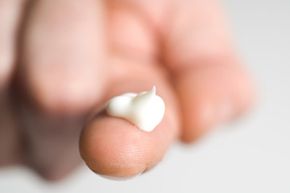The differences between men and women extend beyond physical size, spatial perception and empathy -- the very skins that house our collections of contrasts are different, as well. While any basic moisturizer would serve either gender much better than none at all, there are differences in skin qualities and needs, as well as in the types of moisturizers that are produced and marketed toward both genders.
For instance, while fragrances are more likely to be found in women's moisturizers, they're also more likely to irritate women's skin. Men's skin is thicker and generally less sensitive to irritation by fragrances, but few moisturizers made for men are heavy on scent.
Advertisement
Men are more likely to work or spend longer portions of the day in the sun. As such, men have a strong need for a moisturizer that offers skin protection from the sun.
In addition to being less likely to feel a need to use moisturizer, men are also less likely to use it on parts of their bodies other than their faces. In general, having the softest hands at the gym isn't high on a man's list of priorities. However, excessively dry skin can lead to discoloration of the skin or eczema.
There are some notable differences in the skin of men and women. For example, men's skin has more oil. Before the age of 50 or so, testosterone causes increased oil production. Estrogen, on the other hand, suppresses oil production. As a result, men's skin may naturally age better (under laboratory conditions, that is) but will also be more susceptible to adult acne.
Another difference is that women's skin is thinner, and not just when it comes to jokes about body weight. This means that women are more susceptible to the harmful, aging effects of sun damage. On the other hand, women are more likely to take protective measures in the first place when it comes to using moisturizer. And as a man's oilier skin begins to dry out as he reaches the later years of middle age, his skin becomes thinner, as well.
Due to frequent shaving, most men have facial skin that's more sensitive than women's. This is especially the case when daily shaving goes hand-in-hand with a refusal to use facial moisturizer regularly.
So we know that men's and women's skin is different -- but what's so different about their moisturizers? Keep reading to find out.
Advertisement



